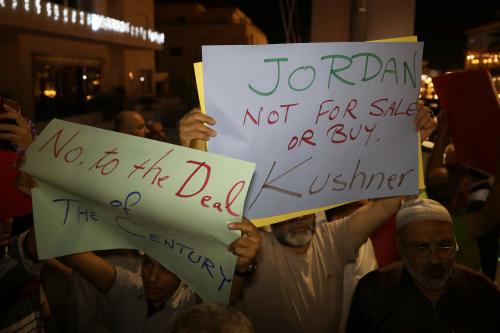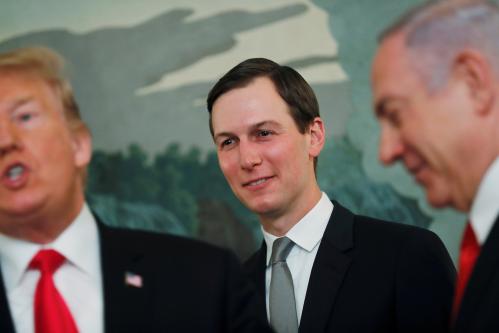Content from the Brookings Doha Center is now archived. In September 2021, after 14 years of impactful partnership, Brookings and the Brookings Doha Center announced that they were ending their affiliation. The Brookings Doha Center is now the Middle East Council on Global Affairs, a separate public policy institution based in Qatar.
The Trump administration has given the Palestinian leadership a rare opportunity. In the run-up to the “Peace to Prosperity” workshop being held in Bahrain on June 25 and 26, the White House released its proposal for economic development in the areas of the West Bank and Gaza Strip where Palestinians have limited self-rule. The glossy, 40-page document and accompanying list of projects is long on aspirations, short on details, and completely divorced from reality on the ground. But it does present a chance to validate Palestinian claims that the administration is intent on extorting them for their political rights and to pivot in a new direction by proposing their own acceptable, realistic alternative.
The Palestinians have every justification to be suspicious of the Trump administration. Over the past two and a half years, the White House has taken a series of steps aimed directly at weakening Palestinian institutions and squeezing the Palestinian leadership. In addition to defunding the Palestinian Authority (PA), it has also stripped financing to development and humanitarian projects at the same time that it has preached about the need for economic development and humanitarian solutions. And the team responsible for devising a peace plan—senior White House advisor Jared Kushner, U.S. Ambassador to Israel David Friedman, and Middle East envoy Jason Greenblatt—has broken with decades of U.S. policies on the status of the occupied territories, including East Jerusalem and the Golan Heights, and the goal of a two-state solution.
Amid plenty of skepticism about Trump’s so-called “deal of the century,” as well as turmoil in Israeli politics, the Kushner-led team decided to shelve the political component of their plan for a later date and roll out the economic portion on its own. While attempting to decouple economics from politics is itself a dubious task, the move has only fed Palestinian suspicions that the Trump administration has ill-intentions regarding their political future.
Indeed, glaringly absent from the document is any mention of a Palestinian national entity. The word “state” only appears in the formulations “neighboring states” and “state-of-the-art.” Even the word “national” only shows up once, to describe Egypt, Lebanon, and Jordan. While Kushner may not want to prejudge the political outcome, it is revealing how far the administration must have gone to scrub the document of anything political whatsoever. The economic development being proposed is only meant to deliver “a vibrant society,” one presumably devoid of national aspirations.
Besides not having a political future, there is not even a political present, as if this economic development will take place in a vacuum. For instance, there is not a single mention of the Israeli military occupation. Nor is there any direct reference to the PA or Hamas. Israel is only mentioned as part of neighboring countries, although reading between the lines it is clear that Israel will remain in control of Palestinian lives and the Palestinian economy. So how can such a plan be implemented when the basic political realities are not even acknowledged?
All Palestinians welcome economic development, including the PA. But they recognize that it can’t happen separate from a simultaneous rollback of the occupation and Israel’s settlement enterprise. Even the idea that progress at one end will generate momentum on the other is misplaced. In 2009, the Palestinian Authority prime minister, Salam Fayyad, introduced a two-year state-building project with the goal of shoring up the institutions of governance in preparation for a state. It failed for precisely this reason, not because the effort was unsuccessful, but because it was not accompanied by any change in the status of the occupation. Without any tangible movement toward statehood, progress in institution building became impossible to sustain; it felt like the PA was working for the occupation rather than against it.
Over the past 25 years, billions of dollars have been poured into the occupied territories in development and humanitarian aid, but the economy has actually been moving in the wrong direction. That is because the occupation does not simply restrict Palestinian economic development, it actively subverts it and redirects growth to the Israeli economy. According to Israeli economist Shir Hever, an estimated 72 percent of international aid to Palestinians ends up in the Israeli economy. Circumventing the occupation in order to deliver development aid is an impossible task.
In response to the economic document released by the White House, Mahmoud Abbas dismissed it out of hand, saying: “As long as there is no political solution, we do not deal with any economic solution.” Feeling under attack, Abbas is clearly being defensive, but with no discernable strategy other than to reject whatever comes his way.
To be sure, the Palestinians are in a difficult position. Abbas ended relations with the United States 18 months ago after the decision to move the U.S. embassy in Israel to Jerusalem and recognize the city as Israel’s capital. Cutting ties with the U.S. is never a good idea. And the administration still has many tools available to punish the Palestinians. But that doesn’t mean they should sit back, unengaged, and just react to Washington’s policy initiatives.
For all the damage he is causing, Trump is shaking things up. That creates opportunities, even if the deck is stacked against the Palestinians. It can start with the economic proposal. Instead of rejecting it out of hand, the Palestinian leadership should hammer the message in the media that they would love to accept this economic vision in the context of having full political rights, either in a state of their own or within a secular, binational state. But, like citizens in America and Israel, Palestinians want the right to vote and elect the leaders that govern their lives. They refuse to live as permanent subjects under the hegemony of a foreign power. And no amount of development assistance can substitute for that right.
While the Palestinian leadership does not need to engage directly with this administration, they should not oppose others from attending the conference. Let them even pledge money. There is little harm in it, because receiving economic development is not inherently contingent on invalidating Palestinian rights. But if the U.S. administration tries to make it contingent on that after the fact, once real money is on the table, then they will expose the hypocrisy and extortion of this exercise. Just let Kushner try and say: “Sorry, you can’t have this money for economic development unless you forfeit your political rights.”
There are other opportunities too. The administration is undermining U.S. credibility with many of its allies, especially in Europe, and blowing up whatever vestiges remain of the peace process. The Palestinians should feel unshackled by this.
For all its virtues, the peace process limited Palestinian maneuverability. Every time they sought to leverage their limited resources to pressure Israel, they were pushed back into a box and told only the negotiation table was the appropriate venue for addressing grievances.
Now they may be able to convince the Europeans that greater pressure must be applied to Israel. And they should launch an international campaign geared toward a rights-based discourse. People around the world can understand the demand for basic political and human rights much more than they can the intricacies of final-status issues, land swaps, 1967 borders, and the nuances of state sovereignty.
The Palestinians could go even further and use this moment to present a Palestinian peace plan that marries economic development with clear, realizable political goals. The world will see that the Palestinians are not simply rejectionists, but that they have legitimate demands and they won’t be bought off.
The Brookings Institution is committed to quality, independence, and impact.
We are supported by a diverse array of funders. In line with our values and policies, each Brookings publication represents the sole views of its author(s).








Commentary
Trump’s economic proposal is an opportunity in disguise
June 26, 2019